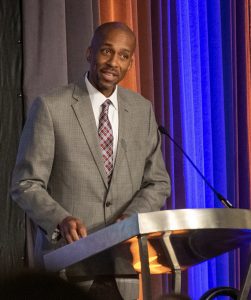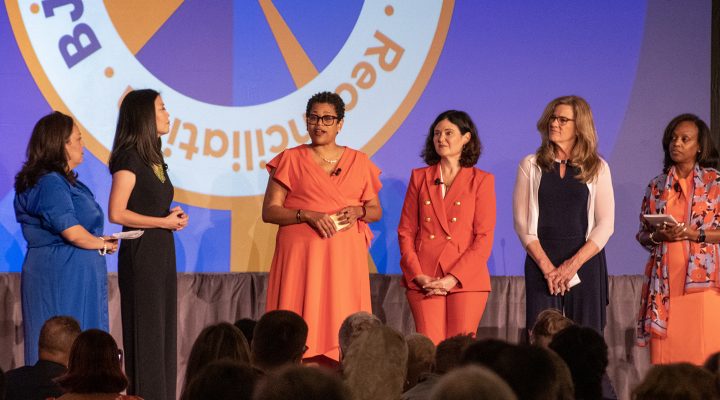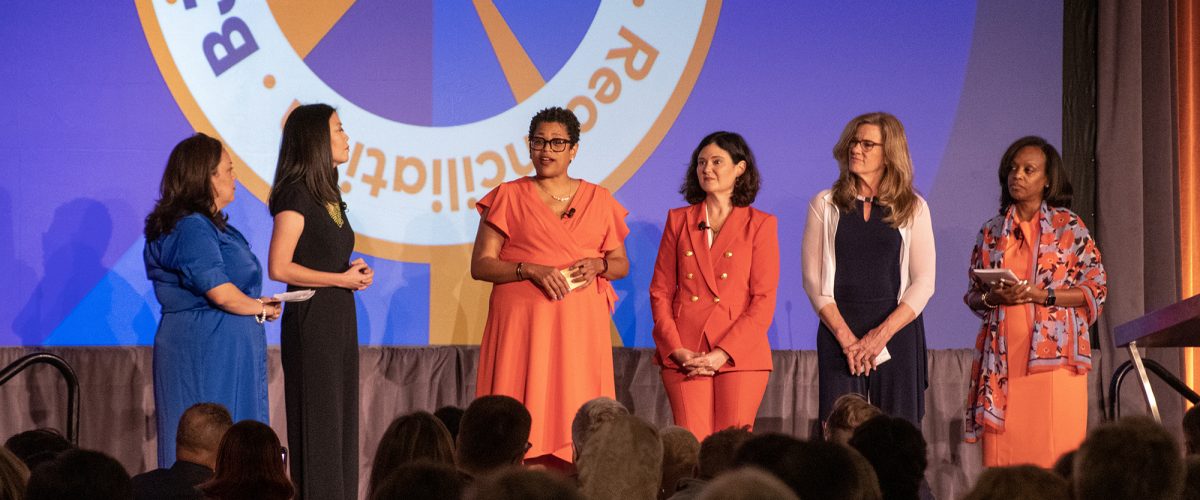Baptist Joint Committee for Religious Liberty and its new Center for Faith, Justice and Reconciliation are urgently needed to counter the white supremacy menacing religious liberty for all in the United States, scholar and Baptist minister Adam Bond said.
They are needed “to develop definitions and strategies around religious freedom that will unmask and combat the racism, sexism and homophobia that inform Christian nationalism and that inform anti-democratic rhetoric and practices in the mainstream of our nation,” said Bond, who is set to join the Baylor University religion faculty in August after serving as pastor of the historic Ebenezer Baptist Church in Richmond, Va.

Adam Bond
Bond delivered the keynote address at BJC’s June 30 luncheon at the Cooperative Baptist Fellowship’s General Assembly in Atlanta.
The program focused on the vision and goals of the center, which was created with assets from the 2019 closure of Baptist Theological Seminary at Richmond. It was acquired by BJC earlier this year.
BJC Executive Director Amanda Tyler explained the operation will “help us expand the conversations about what religious freedom really means” in an era marked by a right-leaning Supreme Court and the expanding influence of Christian nationalism.
Acquiring the center also doubles as an effort to bring racial inclusivity into the defense of religious liberty and atone for BJC’s historic role in excluding people of color from the movement, she said. “Our work is cut out for us. Religious freedom has been white too long, and we repent for the ways our organization contributed to the problem.”
“Religious freedom has been white too long, and we repent for the ways our organization contributed to the problem.”
Bond said he was especially taken by BJC’s description of the traditional inequity of religious liberty advocacy and by the organization’s commitment, through the center, to tap into the wisdom of Blacks, indigenous people and people of color going forward.
“What a provocative and informative way to introduce the work of the center: Public discourse about religious freedom has been white too long. Let that sink in for a moment.”
Historically, demands for religious liberty have been unevenly made and applied, and usually in favor of the majority and at the expense of those on the margins, Bond said. “When is it appropriate to invoke religious freedom? Whose religious freedom has been privileged?”
An example would be Christians in the South, who during the 19th century claimed slavery as a religious right and denounced abolition as a threat to the Christian way of life.
Matters of race continue to skew the debate about religious freedom, Bond said. “Racism makes ‘real Christianity’ suppress its liberating elements while embracing a nationalism that often asks all non-white persons to lose their ethnic and cultural inheritances in a melting pot of American identity.”
While the center is an invitation to dream of a new world, its leaders must develop new definitions and strategies based on the inherent dignity of all people and grounded on the teaching of Jesus to treat others with compassion, Bond said. “What kinds of instruction and practice will interrupt, or disrupt, the discord and give us the permission to explore and embrace faith freedom from the margins instead of the mainstream?”
Finding those strategies is crucial because Christian nationalists have found theirs, Bond added. “Did you know that there are working groups who have leveraged the backlash in this post-George Floyd, Black Lives Matter moment? Did you know that there are groups feeding talking points and strategies to governors who have waged war against AP classes in high schools?”
Bond cited Virginia Gov. Glenn Youngkin’s 2022 executive order banning the teaching of “divisive” concepts in public school, including Critical Race Theory. The Republican later established a hotline to report on teachers who violate the order.
While there are many who can’t spell Critical Race Theory and wouldn’t recognize it if they saw it, they are nevertheless able to stoke fear of it to influence politicians and to raise money for far-right causes, he warned.
“What is your countermove? Where is your working group? The religion that baptizes God in the American flag and makes Jesus a proponent of gun rights is much more pervasive and visible in the public domain than the ideas that the BJC promotes for us to be informed and educated.”
The Center for Faith, Justice and Reconciliation is establishing dialogue and relationships with BIPOC communities to map out those countermoves, Director Sabrina Dent said.
The organization will launch the Religious Freedom Mobile Institute in October. The virtual event brings together Black religious non-theist leaders to discuss the politics of religious freedom and race.
“We are seeking ways to disrupt the narrative in which religious freedom is talked about without the experiences of African Americans,” she explained.
The program began with a dialogue among five women serving BJC in various ways: Anyra Cano, vice chair of the board; Janna Louie, chief of staff; Amanda Tyler, executive director; Holly Hollman, general counsel; and Lynn Brinkley, board chair.


